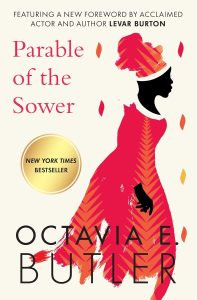 Summary: A young woman in a dystopian world strives to build a life, a community, and a faith, in the midst of chaos.
Summary: A young woman in a dystopian world strives to build a life, a community, and a faith, in the midst of chaos.
I have been slowly working my way through Octavia Bulter’s book since I first read her nearly a decade ago. I have two full length novels and her short story collections yet to read.
Parable of the Sower, like most of her books, is a dystopian novel. Butler published from 1976 until her untimely death in 2006 (she was 58.) Her dystopian was not part of the recent trend. Parable of the Sower was published in 1995. It feels closest to Cormac McCarthy’s The Road (2006), but while just as bleak in description, Parable of the Sower is the story of a young woman, Lauren Olamina, that actually is trying to build something.
The story starts when Lauren is 15, living in a walled community in the remnants of Los Angeles. The novel develops her character and generates the setting while giving us a glimpse of the religious system that she is developing. Lauren is a writer. What she is writing is the philosophy of her religion, Earthseed. Which, when told she is creating a religion, she responds that a person that describes something they found, such as a rock, did not create the wrong, but merely describes it. Earthseed is humanist. It is a philosophy, a way of living. God may exist in it, but that god is distant and not present in the reality of the dystopian world she is living in.
The main story is a travel story. The climate has shifted and drought it perpetual. Water is one of the most lucrative commodities and homelessness, slavery, and drugs are prevalent. The government and police exist in name, but not in ability to maintain structure or order. They are simply another gang that will rob you if you let them. Similarly to Walker Percy’s Love in Ruins (which was written about a decade before Parable of the Sower), this dystopian world is divided by race. And like most of Butler’s books, the main character is an African American woman.
Butler is such a unique voice in the science fiction world. Her work always explores the world of the marginalized and voiceless. Those marginalized are not weak, but repressed. Her characters understand responsibility and hard physical labor, but also the importance of education and philosophy. I do not think there are any main characters that are Christian, but she treats religion seriously, even if flawed in reality. (It is not the negative view of Christianity, or the distortion of Christianity that comes out in Handmaid’s Tale.)
Parable of the Sower is not my favorite of Butler’s books (the favorite is still Kindred). But I will fairly quickly read the sequel, Parable of the Talents. If you are a fan of dystopian or science fiction and have not read Butler, you should.
There is a content warning. Butler deals frankly with sex, rape, other violence, etc. It is not gratuitous violence, but a decent into lawlessness where the powerful rule and take what and whom they want. This is the Book of Judges.
Parable of the Sower by Octavia Butler Purchase Links: Paperback, Kindle Edition, Audible.com Audiobook